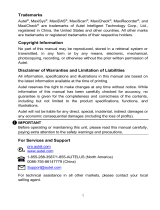
vi
TPMS DIAGNOSIS .....................................................................................79
SENSOR PROGRAMMING .............................................................................83
TPMS RELEARN .......................................................................................89
TPMS BY OEM PART NO. ..........................................................................93
7 DATA MANAGER ...................................................................................98
OPERATIONS ............................................................................................98
8 SETTINGS ........................................................................................... 103
UNIT ...................................................................................................... 103
LANGUAGE ............................................................................................. 104
PRINTING SETTING................................................................................... 105
NOTIFICATION CENTER ............................................................................. 107
AUTO UPDATE......................................................................................... 108
SYSTEM SETTINGS................................................................................... 109
ABOUT ................................................................................................... 110
9 UPDATE ............................................................................................... 112
TABLET UPDATE ...................................................................................... 112
MAXIVCI MINI UPDATE ............................................................................. 115
10 VCI MANAGER ..................................................................................... 116
BT PAIRING ............................................................................................ 117
UPDATE ................................................................................................. 117
PROGRAMMER UPDATE ............................................................................ 118
11 SHOP MANAGER ................................................................................. 119
VEHICLE HISTORY.................................................................................... 120
WORKSHOP INFORMATION ........................................................................ 122
CUSTOMER MANAGER .............................................................................. 123
12 ACADEMY ............................................................................................ 127
13 REMOTE DESK .................................................................................... 128
14 MAXIFIX ............................................................................................... 130
NAVIGATION............................................................................................ 130
OPERATIONS .......................................................................................... 133
15 SUPPORT ............................................................................................ 140




















